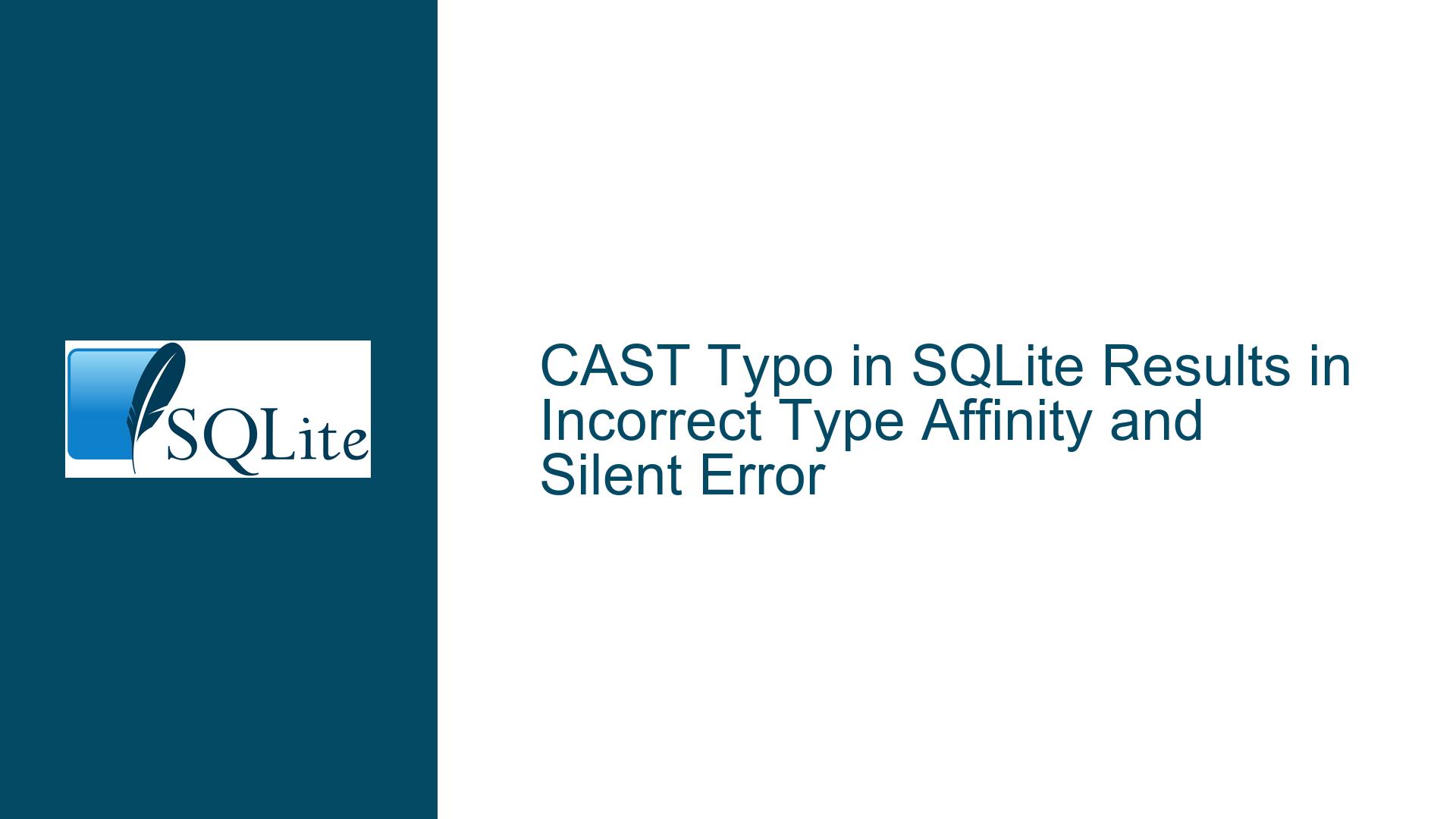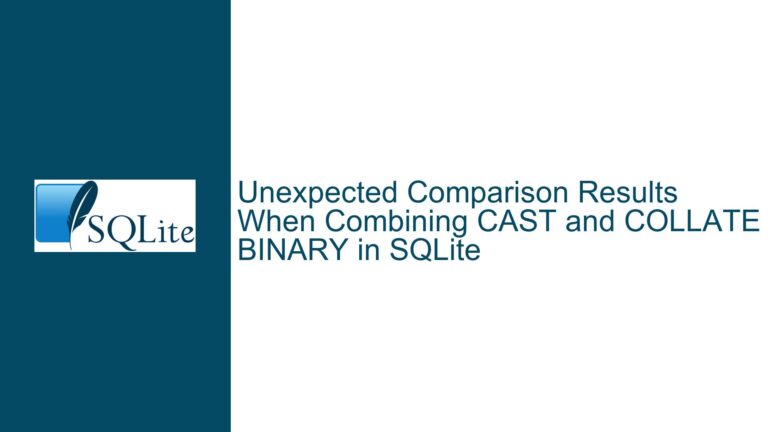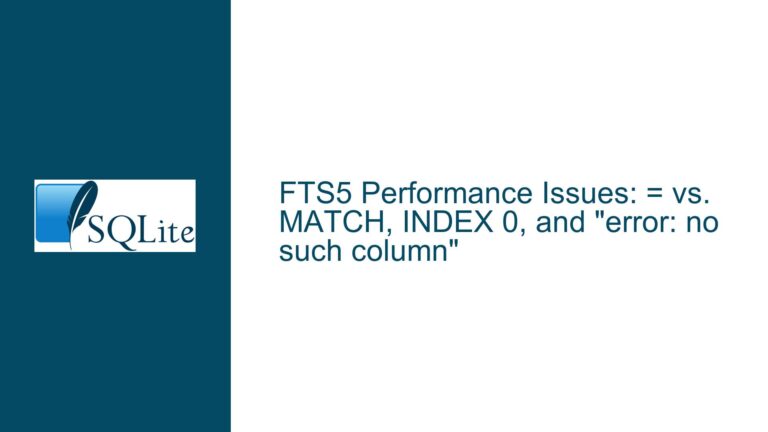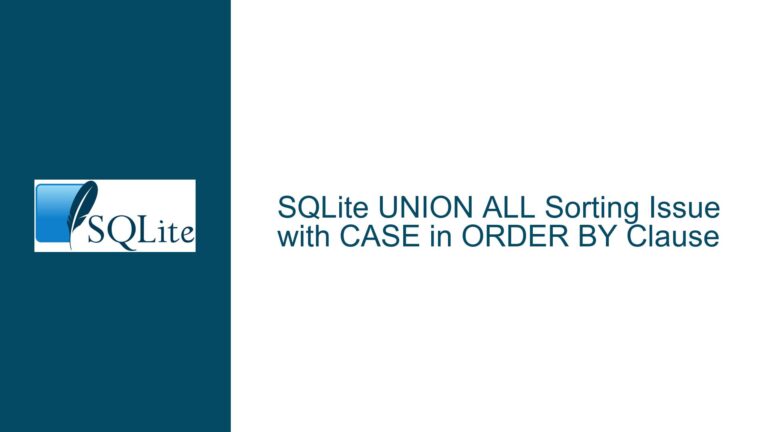CAST Typo in SQLite Results in Incorrect Type Affinity and Silent Error
Understanding Silent Type Affinity Mismatches in CAST Operations
Type Affinity Behavior and Undetected CAST Typos
The core issue revolves around the use of an unrecognized type name in a CAST expression, which does not produce an error in SQLite but instead applies default type affinity rules. In the provided example, the user attempted to cast the integer 1 to a REAL type but misspelled it as READL. SQLite did not raise an error for the invalid type name READL and instead returned an integer division result (0) instead of the expected floating-point result (0.333333333333333). This occurs because unrecognized or misspelled type names in CAST expressions are treated as having NUMERIC affinity by default, which can lead to unintended implicit conversions and arithmetic behavior.
SQLite’s type system is dynamically typed, meaning that values have types, but columns and expressions have type affinity. When a CAST operation specifies an unrecognized type (e.g., READL instead of REAL), SQLite does not validate the type name syntactically. Instead, it maps the unrecognized type to the closest affinity based on its rules. This permissive design allows for flexibility but introduces risks when typos occur in type names. The result is a silent failure where the intended type affinity (e.g., REAL for floating-point operations) is not applied, leading to incorrect calculations or data storage.
Root Causes of Silent CAST Typos and Affinity Mismatches
Unrecognized Type Names in CAST Expressions
SQLite does not enforce strict validation of type names inCASToperations. When an unrecognized type (e.g.,READL) is used, SQLite applies a fallback affinity based on the type name’s resemblance to known affinity categories. SinceREADLdoes not match any predefined affinity rules (INTEGER, TEXT, REAL, BLOB, NUMERIC), it defaults to NUMERIC affinity. This affinity treats the value as an integer if it has no fractional part, leading to integer division in the example.Type Affinity Inference Rules
SQLite’s type affinity system prioritizes flexibility over strictness. TheCASTexpression’s affinity is determined by the declared type in theASclause. For unrecognized types, SQLite checks for substrings in the type name to infer affinity (e.g.,INTinVARCHARmaps to INTEGER affinity). SinceREADLcontains no such substrings, it defaults to NUMERIC affinity. This behavior is documented but counterintuitive for users expecting strict type validation.Absence of Strict Schema Enforcement
Unlike some databases, SQLite does not enable strict schema enforcement by default. Even withPRAGMA strict=ON, theCASToperator’s type name is not validated against a list of known types. This lack of validation allows typos to go undetected at parse time, deferring affinity resolution to runtime.
Diagnosing and Resolving CAST Typos and Affinity Issues
Step 1: Validate Type Names in CAST Operations
Always cross-check type names used in CAST expressions against SQLite’s supported affinities: INTEGER, REAL, TEXT, BLOB, and NUMERIC. For example, CAST(1 AS REAL) is valid, while CAST(1 AS READL) is not. Use the following query to test affinity mapping:
SELECT typeof(CAST(1 AS READL)); -- Returns 'integer' (NUMERIC affinity)
SELECT typeof(CAST(1 AS REAL)); -- Returns 'real'
Step 2: Enable Strict Typing Where Possible
While PRAGMA strict=ON does not affect CAST type validation, it enforces column type strictness in table definitions. Use strict tables to prevent accidental affinity mismatches in stored data:
CREATE TABLE test (x REAL STRICT);
INSERT INTO test VALUES (CAST(1 AS READL)); -- Fails: unrecognized type
Step 3: Use Runtime Type Checking
Add explicit type checks in queries to detect affinity mismatches:
SELECT
CASE
WHEN typeof(CAST(1 AS READL)) = 'real' THEN CAST(1 AS READL) / 3
ELSE RAISE(FAIL, 'Invalid type in CAST')
END;
Step 4: Leverage SQLite Extensions
Use the sqlean extensions’ strict module to enforce stricter type checks. While not part of core SQLite, these extensions can validate type names in CAST operations.
Step 5: Mitigate Arithmetic Errors
When performing division, explicitly cast operands to REAL to avoid integer division:
SELECT CAST(1 AS REAL) / 3; -- Returns 0.333...
Step 6: Schema and Query Linting
Use tools like sqlfluff or sqlite3’s .schema command to audit type names in schema definitions and queries. Automated linting can catch typos before they cause runtime issues.
By understanding SQLite’s type affinity rules and applying proactive validation techniques, users can avoid silent errors caused by typos in CAST operations. The key takeaway is that SQLite’s flexibility requires diligence in type name accuracy and runtime checks to ensure expected behavior.






